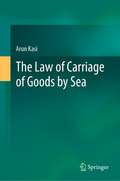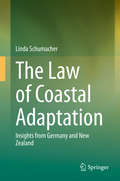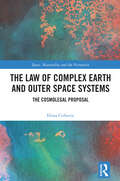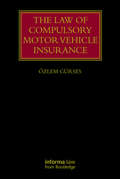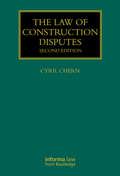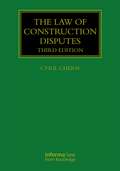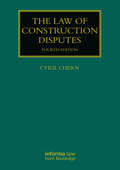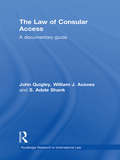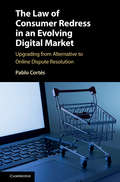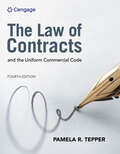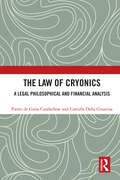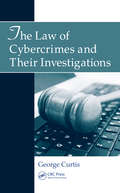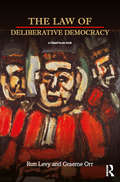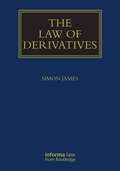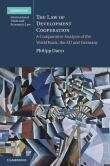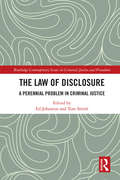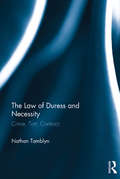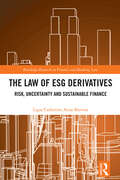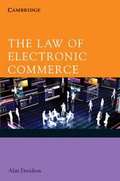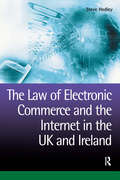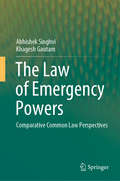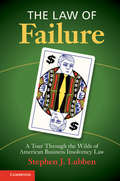- Table View
- List View
The Law of Carriage of Goods by Sea
by Arun KasiThis book, written in three parts, covers the basics of the international trade, financing and the legal framework related to the law of carriage of goods by sea, elaborates on bills of lading in depth and sea waybills and ship’s delivery orders in brief and charterparties in depth. While the book is based on the English law, cases and materials from other jurisdictions, particularly Singapore, Malaysia, India, the USA, and Australia are brought in to provide an international perspective. The practical analyses, commentary and critiques of cases would be a useful guide for practitioners in developing case arguments. Although written with practitioners, academicians and students in mind, the book will also serve as a useful guide for sea carriers, freight forwarders, international traders, financiers, etc. as the complex subject is presented in reader-friendly and easy to grasp manner.
The Law of Coastal Adaptation: Insights from Germany and New Zealand
by Linda SchumacherThis work investigates law as an instrument to deal with the challenges of sea level rise. As the two countries chosen as examples differ significantly in their adaptation strategies and the corresponding legal regulations, the author presents general ideas on how any legal framework facing similar challenges could be improved. In particular, (flood) risk assessments, coastal defences and flood-resistant design as well as spatial and land use planning are discussed, including managed retreat. Moreover, conflicts as well as potential synergies of coastal adaptation and nature conservation are examined.Due to the thorough analysis this book is not just an essential read for policymakers and researchers interested in the coastal area but climate change adaptation in general as many general findings are transferrable to other impacts.
The Law of Complex Earth and Outer Space Systems: The Cosmolegal Proposal (Space, Materiality and the Normative)
by Elena CirkovicThis book offers a paradigm-shifting exploration of lawmaking for the complex interactions between Earth systems and outer space. Drawing on complex systems science, posthuman approaches, and plural ontologies, the author proposes a reimagining of law and governance for the cosmic age. Through the “cosmolegal” perspective, this study embraces the inherent uncertainties and complexities of Earth-space interactions. From Arctic methane craters to orbital debris, the book weaves together scientific insights, landscape architecture, legal theory, and doctrine to address pressing environmental challenges that span Earth and beyond.While legal scholarship has increasingly engaged with Earth System Science, it typically treats outer space as distinct from Earth’s environment. However, Earth’s existence and complex systems are fundamentally intertwined with and emerge from outer space. This book argues that a legal framework for Earth’s systems needs to include outer space.At its core, the book advocates for a “complexification” of law, calling for greater epistemic humility in legal thought and practice. Thoughtful and provocative, this work invites readers to reconsider fundamental assumptions about law, nature, and agency beyond the human in an era of planetary change. The cosmolegal approach aims to shift legal imagination and understanding, positioning human law as just one of many actors within the cosmos.This original work will appeal to scholars of legal theory and environmental law, as well as those interested in posthumanism, ecology, and materialism.
The Law of Compulsory Motor Vehicle Insurance (Lloyd's Insurance Law Library)
by Özlem GürsesThe Law of Compulsory Motor Vehicle Insurance covers motor vehicle compulsory liability insurance in a broad context by putting emphasis on the fundamental principles unique to this type of insurance, their operation together with the general principles of law, and the interventions of the relevant EU Directives and CJEU decisions. The law regarding motor vehicle liability insurance is ever-evolving, fast-developing and offering more intellectual challenges as the disputes vary every day. This book examines the principles applicable in this area of law by studying the grounds where the rules derive from and their continuing developments over decades at both domestic and EU levels. Whilst doing so it also discusses whether the sources of the current applicable law, in several different motor vehicle compulsory insurance related issues, are in line with each other. The book also presents careful analyses of the interplay between the different sources of law, detailed discussions on what the law should be in order to provide consistency amongst the rules and principles identified, and how solutions to newly emerging issues can be found. The regime applicable in this area is overcomplex. This book will be valuable reading for any lawyer, whether academic, practitioner or student who would like to understand the insurance cover required for compulsory motor vehicle third party liability insurance together with the rationale for adopting such rules and their interpretation by the Courts.
The Law of Construction Disputes (Construction Practice Series)
by Cyril ChernNow in a fully updated second edition, The Law of Construction Disputes is a leading source of authoritative and detailed information on the whole area of construction law including contracts and their performance, third parties, pursuing claims and dispute resolution. It covers the construction dispute process by analysing the main areas from which disputes arise, up to date case law, and how to effectively deal with construction project disputes once they have arisen. This edition expands on advanced practitioner issues, as well as the emerging law of construction disputes on an international basis and gives the practitioner all the case law needed in one concise volume. The book examines the methods and methodology of construction law, not only for a common law context, but also under other legal systems. Readers will be guided through the various international contract formats governing construction, alongside applicable case law. Additionally, they will be shown the correct contract provisions and forms used to prevent disputes from escalating in order to reach successful conclusions without litigation. Including expert advice and many relevant reference materials, this book is an extremely helpful guide to legal practitioners and construction professionals.
The Law of Construction Disputes (Construction Practice Series)
by Cyril ChernNow in a fully updated third edition, The Law of Construction Disputes is a leading source of authoritative and detailed information on the whole area of construction law including contracts and their performance, third parties, pursuing claims and dispute resolution. It covers the construction dispute process by analysing the main areas from which disputes arise, up to date case law, and how to effectively deal with construction project disputes once they have arisen. Now including references to the new FIDIC contracts, which were released in 2017, this edition expands on advanced practitioner issues, as well as the emerging law of construction disputes on an international basis and gives the practitioner all the case law needed in one concise volume. The book examines the methods and methodology of construction law, not only for a common law context, but also under other legal systems. Readers will be guided through the various international contract formats governing construction, alongside applicable case law. Additionally, they will be shown the correct contract provisions and forms used to prevent disputes from escalating in order to reach successful conclusions without litigation. Including expert advice and many relevant reference materials, this book is an extremely helpful guide to legal practitioners and construction professionals.
The Law of Construction Disputes (Construction Practice Series)
by Cyril ChernUpdated throughout for this fourth edition, The Law of Construction Disputes maintains its position as a leading source of authoritative and detailed information on the whole area of construction law including contracts and their performance, third parties, pursuing claims and dispute resolution.The book covers the construction dispute process by analysing the main areas from which disputes arise, up-to-date case law, and how to effectively deal with construction project disputes once they have arisen. It provides the legal practitioner with all the case law needed in one concise volume, and examines the methods and methodology of construction law, not only for a common law context, but also under other legal systems. Readers will be guided through the various international contract formats governing construction alongside applicable case law. Additionally, they will be shown the correct contract provisions and forms used to prevent disputes from escalating to reach successful conclusions without litigation.Featuring expert advice and many relevant reference materials, this book is an extremely helpful guide to legal practitioners in this field of law and to construction professionals.
The Law of Consular Access: A Documentary Guide (Routledge Research in International Law)
by John Quigley William J. Aceves Adele ShankOver the past decade, there has been an explosion of litigation at the international and domestic levels concerning consular access for foreign nationals charged with a criminal offence. The issue has complicated relations between countries, with the majority of litigation involving the United States, which has adopted a restrictive view of the consular access obligation. This book brings together for the first time relevant documentary sources on the law of consular access. The book includes significant excerpts alongside commentary on the documents, allowing readers to draw their own conclusions. While presenting information on the Vienna Convention on Consular Relations, the book presents other sources, including bilateral consular agreements, multilateral treaties, and key court cases from various jurisdictions. Many of these sources are not readily accessible. The Law of Consular Access will be of interest to scholars of international law, human rights, and international relations. It will also be of interest to private and government lawyers, as well as diplomats and consuls.
The Law of Consumer Redress in an Evolving Digital Market: Upgrading from Alternative to Online Dispute Resolution
by Pablo CortésThis book advances the emerging of a new sub-field of study, the law of consumer redress, which encompasses the various dispute resolution processes for consumers, their regulations, and best practices. The book argues that the institutionalisation of alternative dispute resolution (ADR) bodies are expanding their functions beyond dispute resolution, as they are increasingly providing a public service for consumers that complements, and often replaces, the role of the courts. Although the book focuses on ADR, it also analyses other redress methods, including public enforcement, court adjudication and business internal complaints systems. It proposes a more efficient rationalisation of certified redress bodies, which should be better co-ordinated and accessible through technological means. Accordingly, the book calls for greater integration amongst redress methods and offers recommendations to improve their process design to ensure that, inter alia, traders are encouraged to participate in redress schemes, settle early meritorious claims and comply with outcomes. Incorporates recent legal developments in the field of consumer redress keeping abreast with fundamental legal changes. Examines different consumer redress models, and European as well as various national dispute resolution schemes. Discusses how technology is being imbedded into the dispute resolution process looking at the intersection of technology and dispute resolution.
The Law of Contract 1670-1870
by Warren SwainThe foundations for modern contract law were laid between 1670 and 1870. Rather than advancing a purely chronological account, this examination of the development of contract law doctrine in England during that time explores key themes in order to better understand the drivers of legal change. These themes include the relationship between lawyers and merchants, the role of equity, the place of statute, and the part played by legal literature. Developments are considered in the context of the legal system of the time and through those who were involved in litigation as lawyers, judges, jurors or litigants. It concludes that the way in which contract law developed was complex. Legal change was often uneven and slow, and some of the apparent changes had deep roots in the past. Clashes between conservative and more reformist tendencies were not uncommon.
The Law of Contracts and the Uniform Commercial Code
by Pamela R. TepperIntroduce all of the important features of common law contracts as well as Article 2 of the Uniform Commercial Code with Tepper's THE LAW OF CONTRACTS AND THE UNIFORM COMMERCIAL CODE, 4E. This understandable approach reduces contract law to its basic components with examples that build upon one another. Real cases demonstrate how to apply concepts, while a fact pattern in each chapter highlights how contracts and related concepts impact daily lives, often with unusual results. Chapter summaries and reviews, exercises and a running glossary work with learning objectives to help students fully grasp this complex area of law. Students remain engaged with this edition's unique emphasis on real contract situations familiar to readers from the internet or social media. Intriguing examples, exercises and cases reinforce this practical application of contract concepts not found in most legal texts. MindTap digital resources further strengthen students' understanding and application of principles.
The Law of Corporations and Other Business Organizations
by Angela SchneemanThis book deciphers the complex substantive and procedural laws surrounding U.S. business entities today. Focusing on corporations, sole proprietorships, partnerships, limited liability partnerships, and limited liability entities, the text explains the law and the theory behind the law while providing practical information that you can take to the office. Financial structures, securities regulations, mergers, and bankruptcy round out the legal discussions, along with special attention paid to the current Uniform Acts and Model Business Corporation Act used by most state legislatures to create state-specific laws. Special features include sample paragraphs, and practical advice that you can use on the job as a corporate paralegal.
The Law of Cryonics: A Legal Philosophical and Financial Analysis
by Pierre de Gioia Carabellese Camilla Della GiustinaThis book, through the lens of interdisciplinary legal analysis, draws a subtle balance between bioethics and financial regulation, with the latter playing an unexpectedly crucial role in the way life may potentially be governed. The legal topic of human preservation or cryoconservation was initially developed in the United States in the case of Donaldson v. van de Kamp. More recently, the subject arose in Europe as a result of a decision of the High Court, Family Division, London. This new theme of cryoconservation has unfolded through multifaceted forms, including its impact on regulation. In an area that may, at least prima facie, be regarded as belonging to the traditional realm of medical law, the findings presented here suggest that its potential has strong economic implications. The work argues that it is necessary also to look at this subject from a more interdisciplinary perspective, drawing a fil rouge between two otherwise seemingly opposing areas of law: medical law and financial regulation. The legal framework draws on the Anglo-American, and the United Kingdom in particular, along with civil law analysis from Italy. The work will be of interest to researchers and academics in the areas of medical law, legal philosophy, financial law, property law and insurance law.
The Law of Cybercrimes and Their Investigations
by George CurtisCybercrime has become increasingly prevalent in the new millennium as computer-savvy criminals have developed more sophisticated ways to victimize people online and through other digital means. The Law of Cybercrimes and Their Investigations is a comprehensive text exploring the gamut of issues surrounding this growing phenomenon.After an introduct
The Law of Deliberative Democracy
by Ron Levy Graeme OrrLaws have colonised most of the corners of political practice, and now substantially determine the process and even the product of democracy. Yet analysis of these laws of politics has been hobbled by a limited set of theories about politics. Largely absent is the perspective of deliberative democracy – a rising theme in political studies that seeks a more rational, cooperative, informed, and truly democratic politics. Legal and political scholarship often view each other in reductive terms. This book breaks through such caricatures to provide the first full-length examination of whether and how the law of politics can match deliberative democratic ideals. Essential reading for those interested in either law or politics, the book presents a challenging critique of laws governing electoral politics in the English-speaking world. Judges often act as spoilers, vetoing or naively reshaping schemes meant to enhance deliberation. This pattern testifies to deliberation’s weak penetration into legal consciousness. It is also a fault of deliberative democracy scholarship itself, which says little about how deliberation connects with the actual practice of law. Superficially, the law of politics and deliberative democracy appear starkly incompatible. Yet, after laying out this critique, The Law of Deliberative Democracy considers prospects for reform. The book contends that the conflict between law and public deliberation is not inevitable: it results from judicial and legislative choices. An extended, original analysis demonstrates how lawyers and deliberativists can engage with each other to bridge their two solitudes.
The Law of Derivatives
by Simon JamesThis volume focuses on the legal risks arising in English law in the course of derivatives transactions. It discusses the following issues: the legal risks arising in the negotiation and conduct of derivatives transactions; the regulation of the derivatives market; the capacity to enter into derivatives transactions and the standard term upon which this is done; the consequences of default by a counterparty; and the standard terms on which derivatives are entered into, particularly the ISDA Master Agreement.
The Law of Development Cooperation
by Philipp DannDevelopment interventions are agreed by states and international organisations which administer public development funds of huge proportions. They have done so with debatable success, but, unlike the good governance of recipients, the rules applying to donors have hitherto received little scrutiny. This analysis of the normative structures and conceptual riddles of development co-operation argues that development co-operation is increasingly structured by legal rules and is therefore no longer merely a matter of politics, economics or ethics. By focusing on the rules of development co-operation, it puts forward a new perspective on the institutional law dealing with the process, instruments and organisation of this co-operation. Placing the law in its theoretical and political context, it provides the first comparative study on the laws of foreign aid as a central field of global public policy and asks how accountability, autonomy and human rights can be preserved while combating poverty.
The Law of Disability Discrimination
by Ruth Colker Paul Grossman Adam MilaniThe purpose of this book is to provide students with an in-depth understanding of the ADA, including the sections governing employment (Title I), public entities (Title II), and public accommodations (Title III). The book focuses on the major components of the ADA, with extensive reference to the implementing regulations and accompanying guidance statements--essential building blocks for a complete understanding of the Act. It also covers a wide range of additional topics, such as education, housing, insurance, and the protection of newborns with disabilities. Because the ADA intersects several other federal statutes, such as the IDEA, the FHAA, and Section 504 of the Rehabilitation Act, cross-references to these and other statutes are frequently provided. A companion book, The Law of Disability Discrimination Handbook: Statutes and Regulatory Guidance, includes reference material relevant to interpreting federal law prohibiting discrimination on the basis of disability. The Handbook includes the statutory language of each of the five Titles of the ADA. In addition, with respect to Titles I, II, and III, the Handbook includes the regulations and interpretive guidance promulgated by the EEOC and the United States DOJ. The Handbook also includes reference material relevant to interpreting Section 504 of the Rehabilitation Act of 1973 and the Fair Housing Act Amendments of 1998, as well as excerpts from the Civil Rights Act of 1991. Further, the Handbook contains the text of the IDEA, the Department of Education Regulations implementing the IDEA, and the Convention on the Rights of Persons with Disabilities.
The Law of Disclosure: A Perennial Problem in Criminal Justice (Routledge Contemporary Issues in Criminal Justice and Procedure)
by Ed Johnston; Tom SmithThis edited collection explores the topic of disclosure of evidence and information in the criminal justice process. The book critically analyses the major issues driving the long-standing problem of dysfunctional disclosure practice, with contributions from academics, lawyers, former police officers, and current police policymakers. The ultimate objective is to review the key problems at the investigative, trial and post-conviction stages of criminal proceedings, and to suggest a way forward through potential routes of reform, both legal and cultural. The collection represents a significant and novel contribution to the policy debate regarding disclosure, and advances thought on resolving this issue in a fair and sustainable manner. The book provides a valuable resource for academics, practitioners and policymakers working on this vital aspect of criminal procedure.
The Law of Duress and Necessity: Crime, Tort, Contract
by Nathan TamblynThe language of duress and necessity is found in crime, tort and contract. This book explores those pleas, in both case law and theory, across the subject boundaries, and across jurisdictions. In doing so, it seeks to identify the lessons which each area of law can learn from the others, and to tease out common themes while demarcating important differences. The overall outcome is a law more coherent and understood in sharper detail. This book considers the law of England and Wales, Australia, New Zealand, Hong Kong and Canada, as well as the American tortious defence of necessity.
The Law of ESG Derivatives: Risk, Uncertainty and Sustainable Finance (Routledge Research in Finance and Banking Law)
by Ligia Catherine Arias BarreraThis book weaves together a comprehensive legal analysis of sustainable finance regimes governing Environment, Social and Governance (ESG) derivatives, with insightful sociological perspectives on risks and uncertainties.Sustainable finance offers a unique chance to channel capital towards sustainability goals, with ESG derivatives emerging as potent catalysts for a transition to a more sustainable economy. Beyond amplifying capital flow, they strategically align with effective ESG risk and uncertainty management. The book explores how integrating ESG derivatives can strategically serve sustainable investment, offering insights into optimal risk management. The work not only outlines challenges but presents potential solutions, highlighting ESG derivatives’ role in addressing market failures affecting sustainable finance, which is an aspect often overlooked by regulators in the EU, the UK, and the US. Serving as a strategy guide for countries adopting a diverse sustainable finance portfolio, the book targets policy practitioners and advocacy specialists, catering to a broad multidisciplinary audience amid the increasing interest in ESG-related products.The book’s dual emphasis on financial derivatives for ESG risk management and sociological perspectives positions it as an ideal resource for scholars, experts, practitioners, researchers, and curious minds across law, business, management, and sociological studies.
The Law of Electronic Commerce
by Alan DavidsonWritten specifically for legal practitioners and students, this book examines the concerns, laws and regulations involved in Electronic Commerce. In just a few years, commerce via the World Wide Web and other online platforms has boomed, and a new field of legal theory and practice has emerged. Legislation has been enacted to keep pace with commercial realities, cyber-criminals and unforeseen social consequences, but the ever-evolving nature of new technologies has challenged the capacity of the courts to respond effectively. This book addresses the legal issues relating to the introduction and adoption of various forms of electronic commerce. From intellectual property, to issues of security and privacy, Alan Davidson looks at the practical changes for lawyers and commercial parties whilst providing a rationale for the underlying legal theory.
The Law of Electronic Commerce and the Internet in the UK and Ireland
by Steve Hedley'Internet law' and 'electronic commerce law' are new entities and as such there is some difficulty in defining this rapidly changing area of the law. Scholars are divided as to whether it is a subject in its own right or part of a broader area and there is also debate concerning its status as a new law or as old law which needs interpreting in a new way. This text helps the student to unravel this complicated area of law and provides guidance through the wealth of literature available on the topic. The text is for law students coming towards the end of their first degree, or taking a Masters. The first half focuses on the principles of electronic commerce law and includes an introduction to the law of the Internet, basic concepts in intellectual property law, privacy law and data protection. The second part deals with rights and duties in the online world including, liabilities, ownership and contracts. Technical operations are explained in the text as necessary and a glossary provides a guide to the more commonly encountered computer technicalities. With a supporting website providing links to online further reading, this textbook is ideal for students of e-commerce law and will provide those studying information technology law or practising commercial law with an indispensable introduction to Internet issues.
The Law of Emergency Powers: Comparative Common Law Perspectives
by Abhishek Singhvi Khagesh GautamThis book presents a comprehensive legal and constitutional study of emergency powers from a comparative common law perspective. It is one of very few comparative studies on three jurisdictions and arguably the first one to explore in detail various emergency powers, statutory and common law, constitutional and statutory law, martial law and military acting-in-aid of civil authority, wartime and peacetime invocations, and several related and vital themes like judicial review of emergency powers (existence, scope and degree). The three jurisdictions compared here are: the pure implied common law model (employed by the UK), implied constitutional model (employed by the USA) and the explicit constitutional model (employed by India). The book’s content has important implications, as these three jurisdictions collectively cover the largest population within the common law world, and also provide maximum representative diversity. The book covers the various positions on external emergencies as opposed to internal emergencies, economic/financial emergencies, and emergent inroads being made into state autonomy by the central or federal governments, through use of powers like Article 356 of the Indian Constitution. By providing a detailed examination of the law and practice of emergency powers, the book shares a wealth of valuable insights. Specific sub-chapters address questions like – what is the true meaning of ‘martial law’; who can invoke ‘martial law’; when can it be invoked and suspended; what happens when the military is called in to aid civilian authorities; can martial law be deemed to exist or coexist when this happens; what are the limits on state powers when an economic emergency is declared; and, above all, can, and if so, when and how should courts judicially review emergency powers? These and several other questions are asked and answered in this study. Though several checks and constraints have been devised regarding the scope and extent of ‘emergency powers,’ these powers are still prone to misuse, as all vast powers are. A study of the legal propositions on this subject, especially from a comparative perspective, is valuable for any body politic that aspires to practice democracy, while also allowing constitutionally controlled aberrations to protect that democracy.
The Law of Failure: A Tour Through the Wilds of American Business Insolvency Law
by Stephen J. LubbenIf a broker-dealer liquidates in federal bankruptcy court, why does an insurance company liquidate in state court, and a bank outside of court altogether? Why do some businesses re-organize under state law 'assignments', rather than the more well-known Chapter 11 of the Bankruptcy Code? Why do some laws use the language of bankruptcy but without advancing policy goals of the Bankruptcy Code? In this illuminating work, Stephen J. Lubben tackles these questions and many others related to the collective law of business insolvency in the United States. In the first book of its kind, Lubben notes the broad similarities between the many insolvency systems in the United States while describing the fundamental differences lurking therein. By considering the whole sweep of these laws - running the gamut from Chapter 11 to obscure receivership provisions of the National Bank Act - readers will acquire a fundamental understanding of the 'law of failure'.
